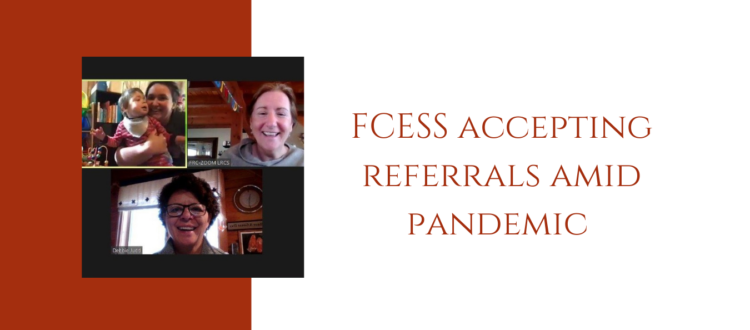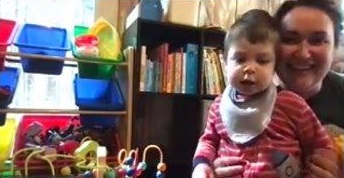Family-Centered Early Supports and Services accepting new referrals amid pandemic
By four months old, Whitney Rino knew her son Max wasn’t progressing with his gross motor skills at the same pace his older brother once did. She brought her concerns to their pediatrician who referred them to the Family-Centered Early Supports and Services (FCESS) program at the Family Resource Center of Central New Hampshire in Laconia.
FCESS, New Hampshire’s Early Intervention system, is a service provided to families and children under the age of three who have a developmental delay, disability or an established condition. Services are provided in the home and the community to assist families in providing the best evidence based practices to increase a child’s growth and development.
The Rino family has since had vision specialists and physical therapists visit their home in person, and now online, teaching them techniques while working with Max to enhance his development. “The parent is the child’s first teacher,” said FCESS program manager, Brenda Greene. “Our model is successful because we not only work with the child, but we also coach and instruct the families. We provide our parents and guardians the tools, strategies, and resources to use when our team isn’t there.”
With safety as a top priority now more than ever, FCESS is available through telehealth (phone and video conferencing), and with warmer weather, visits with families will begin in person, outdoors, following CDC guidelines.
Unfortunately, since the beginning of the pandemic, the Family Resource Center of Central New Hampshire has seen a significant decrease in the number of intakes for this program. From 2019 to 2020, the program has seen fewer children referred to early intervention services.
Since pediatricians are their most common referrals, Greene contributes this decline in numbers to families not attending regular doctor visits due to COIVD-19 related reasons. “We want families to know that they do not need to wait to see their doctor to get a referral into this program. As long as we have consent from the child’s parent or guardian, referrals can come from almost anyone – parents or guardians, friends, or medical professionals,” Greene reiterated.
Since starting the program in 2018, Whitney Rino has seen major improvements in her son Max. “I am most proud that Max is now able to move with the help of adaptive mobility equipment,” said Rino. “He can be upright and move around on his own which has significantly increased his independence.”
When reflecting on her three years with FCESS Rino, with tears in her eyes said, “It’s been a really hard couple of years processing that my son has disabilities and special needs, but ever since starting this program I have always felt very supported. Our ESS team has been a huge blessing not only in Max’s life but mine as well.”
The Family Centered Early Supports and Services program continues to take new referrals for children ages 0-3 in Belknap and Lower Grafton counties. Families can receive an intake and developmental evaluation for their child at no cost to the family. If you could benefit from this program, please contact Tylaine at 603-581-1578 or email tylaine.guarriello@lrcs.org.


